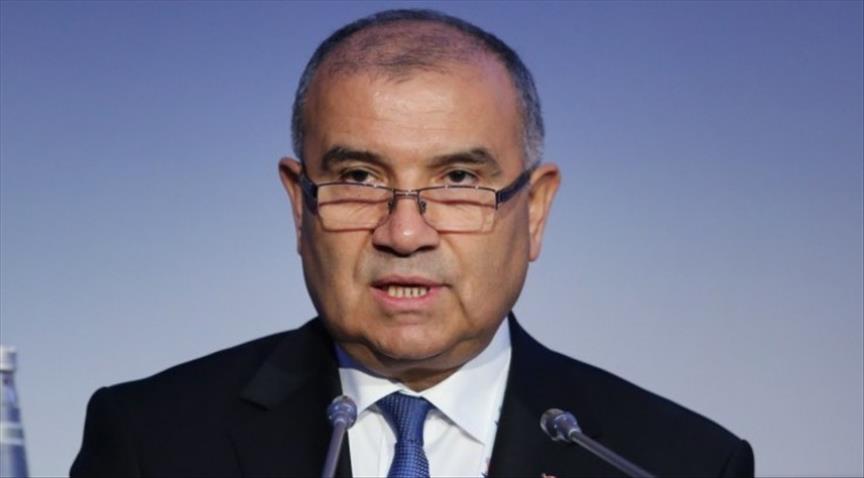Turkey's Ministry of Energy and Natural Resources dismissed Saturday some recent claims against the country's energy projects and gas price revisions in its energy deals.
Some Turkish newspapers recently claimed in their articles that Turkey's economy is damaged by the price revisions in the existing gas deal with Azerbaijan and the Trans-Anatolian Natural Gas Pipeline (TANAP) that is under construction.
However, the ministry said in a statement that the gas deal is open to price revisions, just like other gas agreements in the world.
'The natural gas deal signed between Turkey's state-owned pipeline corporation BOTAS and Azerbaijan Gas Supply Company on March 21, 2001 includes regulations about gas price revisions. When the conditions of the deal are met, price can be revised. It is the right of the seller to ask for a price increase, and the right of the buyer for a price reduction,' the statement read.
The energy ministry noted that increasing natural gas prices in the world has led Turkey and Azerbaijan to revise the price of gas traded between the two countries.
'Thus, when Azerbaijan called for negotiations with Turkey to revise the gas price, it was changed accordingly. BOTAS has the right to re-export Azeri gas, and that was not changed in the agreement. The right to re-export does not have any impact on the take-or-pay clause of the deal,' it added.
Turkey buys around 6.6 billion cubic meters (bcm) of gas annually from Azerbaijan through the South Caucasus Pipeline at the moment. Moreover, when TANAP becomes operational in 2018, 16 bcm of additional gas will be carried from Azerbaijan to Turkey and some of it will be re-exported to Europe via the Trans Adriatic Pipeline (TAP). This annual capacity is planned to reach 23 bcm by 2023 and 31 bcm by 2026.
Turkey's Energy and Natural Resources Minister Ali Riza Alaboyun had also responded to claims about the gas price in an interview with Turkish TV channel A Haber on Friday, and said 'Turkey did not sustain losses by importing Azeri gas. We can clearly say that Azeri gas is the cheapest gas that Turkey imports. The claims in that regard are totally wrong and baseless.'
- Nabucco and TANAP
The energy ministry also dismissed newspapers' claims against the reasons for cancelling the proposed Nabucco gas pipeline project.
'The claim stating that providing Russia the right of passage through the Black Sea 'has dumped Nabucco' does not reflect the truth. Providing right of passage [to Russia] through Turkey's economic zone in the Black Sea within the context of the South Stream Pipeline project has nothing to do with Nabucco, TANAP or TAP,' the statement said.
South Stream Pipeline was a proposed project to carry Russian gas to Bulgaria and further into Europe. But, it was cancelled on Dec. 2014 due to EU regulations. Instead, Russian President Vladimir Putin proposed the Turkish Stream pipeline that plans to carry Russian gas to Greece via Turkey.
Nabucco pipeline was planned to carry Azeri and Turkmen gas to Europe via Turkey, In addition, Iranian and Iraqi gas were also considered to be added to the pipeline. Despite Europe's willingness, the project could not be realized due to its high cost.
'Nabucco project was not found commercially feasible by the Shah Deniz consortium, while Turkey and Azerbaijan agreed to build TANAP instead,' the energy ministry said in the statement.
'In addition to gas transport deal between Turkey and Azerbaijan, the two countries have also signed other agreements that envision natural gas cooperation. With those agreements, BOTAS' share in TANAP rose from 20 to 30 percent, while Turkish Petroleum's (TPAO) share in Shah Deniz field and South Caucasus Pipeline increased from 9 to 19 percent. That way, Turkey's state companies gained to have a say in the production-transportation-marketing chain in natural gas sector.
- Licenses are given based on legislation
The energy ministry also dismissed newspapers' claims stating that licenses of transporting Russian oil, gas and Kurdish gas are approved outside the regulatory framework.
'The companies that wanted to have energy trade -- oil, petroleum products, natural gas, electricity -- with northern Iraq, had license approvals based on Turkey's existing legislations and regulations,' the ministry's statement read.
'Within the rule of law, it is out of the question for the Turkish government granting privilege to any individuals, companies or institutions,' the statement concluded.
By Ovunc Kutlu
Anadolu Agency
ovunc.kutlu@aa.com.tr


